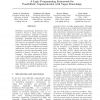1036 search results - page 35 / 208 » Incompleteness of Behavioral Logics |
UAI
2004
13 years 10 months ago
2004
Defeasible argumentation frameworks have evolved to become a sound setting to formalize commonsense, qualitative reasoning from incomplete and potentially inconsistent knowledge. ...
DKE
2008
13 years 8 months ago
2008
Logic is currently the target of the majority of the upcoming efforts towards the realization of the Semantic Web vision, namely making the content of the Web accessible not only t...
ECAI
2004
Springer
14 years 2 months ago
2004
Springer
We provide a logical model of biochemical reactions and show how hypothesis generation using weakest sufficient and strongest necessary conditions may be used to provide addition...
IBERAMIA
2004
Springer
14 years 2 months ago
2004
Springer
The theory of multi-adjoint logic programs has been introduced as a unifying framework to deal with uncertainty, imprecise data or incomplete information. From the applicative part...
RULEML
2004
Springer
14 years 2 months ago
2004
Springer
Abstract. Defeasible reasoning is a rule-based approach for efficient reasoning with incomplete and inconsistent information. Such reasoning is, among others, useful for ontology i...

